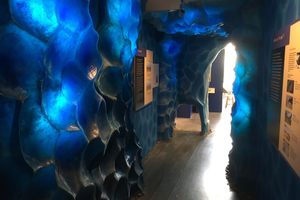Ice Age Glacial Exhibit in Ithaca, New York

During the last Ice Age, the Finger Lakes region of New York was covered by a glacier over two miles thick. This wall of ice permanently sculpted the landscape, scratched rocky outcrops, and gouged deep valleys that became the Finger Lakes themselves.
The Museum of the Earth, part of the Paleontological Research Institution (PRI) in Ithaca, New York, features an exhibit devoted to educating visitors about this dynamic age of North America’s prehistory. Exhibits range from glacial connections to the Earth’s climate, to their effects on flora, fauna, and geology.
The centerpiece of the exhibit is a walkthrough replica of a glacial ice cave with translucent blue walls that almost seem to glow from within. The experience is enhanced by the ambient sounds of dripping water played throughout the tunnel. The ice cave leads to a reconstructed Hyde Mastodon. Mastodons roamed the tundra in the wake of the retreating glaciers, so it’s fitting that this one lies at the end of the museum’s artificial ice cavern.
The PRI was founded in 1932 by Cornell University geology professor Gilbert Dennison Harris. Harris wanted a venue at Cornell to store and showcase his vast and scientifically important collection of invertebrate fossils. He also wanted the university to continue the printing company he had established to publish his research papers. When Cornell would not support either request, Harris founded the PRI as a separate organization to house his collections and continue his publishing business.
Initially located in a small building on Harris’s own property, the PRI struggled to stay afloat for many years. Gradually, board members were able to build up enough funding to expand their establishment into a public museum in 2003. It was coined the Museum of the Earth.
In addition to the glacier exhibit, the Museum of the Earth also has extensive displays of fossils from New York and other regions around the world.





